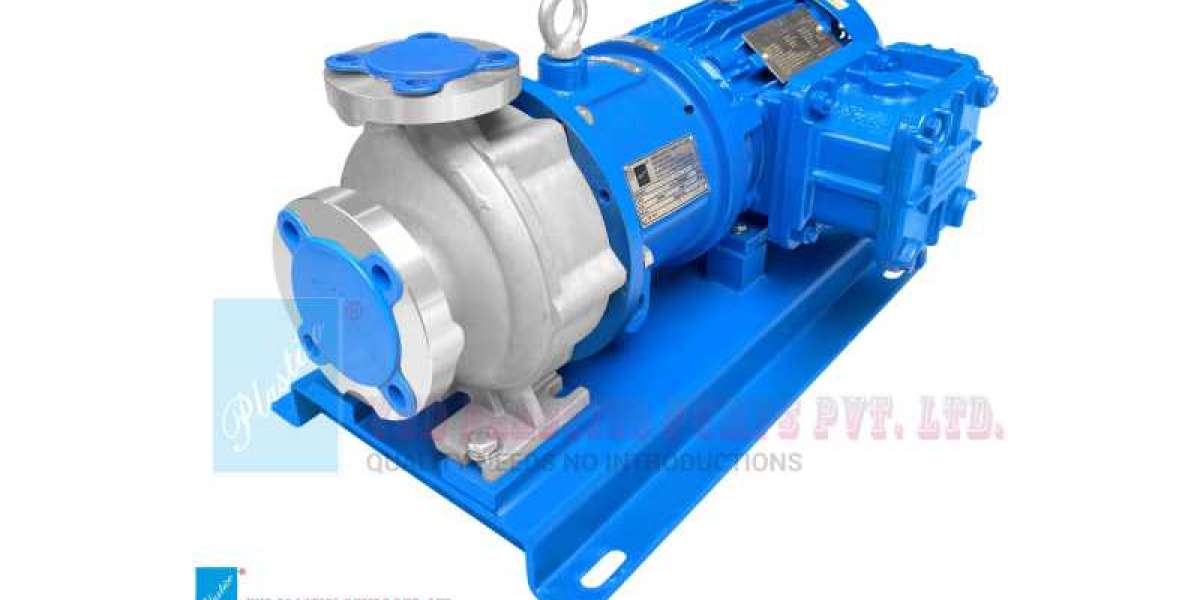Introduction to Process Pumps
In today’s rapidly evolving industries, moving fluids safely and efficiently is crucial. That’s where process pumps come into play. These are specially designed pumps used in industrial settings to transfer chemicals, water, oil, and other liquids in a controlled manner.
One of the most reliable types is the centrifugal chemical process pump, which is widely used in chemical, pharmaceutical, and food processing industries. Whether you are transporting corrosive acids or high-temperature liquids, this pump is built to handle it all.
Companies like VND Plastico Pumps in India are leading the way by manufacturing top-quality industrial process pumps that offer durability, performance, and safety. If you’re seeking a deeper understanding of what these pumps are, how they work, and where they’re used.
What Is a Centrifugal Chemical Process Pump and How Does It Work?
A Centrifugal Chemical Process Pump is a specific type of process pump that uses centrifugal force to move fluids. It works by converting rotational energy—usually from a motor—into energy in a moving fluid. Here’s how it works in simple terms:
- The impeller inside the pump rotates rapidly.
- As the impeller spins, it creates a vacuum that draws fluid into the pump.
- The fluid gains velocity as it moves outward through the impeller.
- This velocity is converted into pressure, pushing the fluid through the discharge pipe.
The beauty of the centrifugal design lies in its simplicity and efficiency. These pumps have fewer moving parts, which means less maintenance and longer service life.
What makes them chemical-compatible? Materials like PVDF (Polyvinylidene Fluoride), polypropylene, or stainless steel are used to ensure resistance against corrosion, making PVDF centrifugal process pumps ideal for chemical handling.
Key Differences Between General Process Pumps and Centrifugal Chemical Process Pumps
While both are essential in fluid transfer, there are some important differences:
1. Function and Design
- General process pumps can include positive displacement types, gear pumps, diaphragm pumps, and more.
- Centrifugal chemical process pumps rely on centrifugal force and are ideal for consistent, high-volume fluid movement.
2. Material Compatibility
- General process pumps may not be suitable for corrosive or high-temperature liquids.
- Centrifugal chemical and process pumps are specifically designed for chemical compatibility, often using materials like PVDF or stainless steel.
3. Maintenance and Operation
- General pumps might require frequent checks and part replacements.
- Centrifugal pumps are often easier to maintain due to fewer moving parts and simplified internal structure.
4. Application Suitability
- General process pumps are suitable for a wide range of uses.
- Centrifugal chemical process pumps are best suited for chemical, pharmaceutical, and corrosive fluid applications.
Where Are Process Pumps and Centrifugal Chemical Process Pumps Used?
Process pumps are used across nearly every sector of industry. Some of the most common sectors include:
1. Chemical Industries
- For transferring acids, solvents, and other aggressive fluids.
- Centrifugal chemical process pumps are perfect for this environment due to their corrosion resistance.
2. Water Treatment Plants
- Used for pumping sludge, water, or treatment chemicals.
- Industrial process pumps play a key role in these systems.
3. Pharmaceutical Industry
- For precise transfer of liquids in sterile environments.
- Pumps must comply with hygiene and safety standards.
4. Food and Beverage Processing
- Handling of liquids like milk, juice, and sauces.
- Clean, efficient pumps like centrifugal process pumps are widely preferred.
5. Textile and Paper Mills
- Used in dye circulation, bleaching, and effluent management systems.
In India, the demand for reliable process pumps in India is growing rapidly due to expanding industrial sectors and increasing focus on environmental safety.
How to Choose the Right Centrifugal Chemical Process Pump for Your System
Choosing the correct centrifugal chemical process pump is critical for both efficiency and safety. Here are a few tips based on over two decades of industry experience:
1. Understand Your Fluid
- Know the chemical nature, viscosity, and temperature of the liquid.
- Corrosive fluids may require PVDF centrifugal process pumps or stainless steel construction.
2. Check Flow Rate and Head
- Calculate the amount of fluid you need to move per hour and the pressure needed.
- Oversizing or undersizing can reduce performance and damage the pump.
3. Look for Material Compatibility
- Always select pumps with chemical-resistant materials if handling aggressive fluids.
4. Consider the Environment
- Will the pump be used in a hazardous area?
- If yes, explosion-proof motors and sealed systems may be necessary.
5. Choose a Trusted Manufacturer
- Go with process pump manufacturers who have a proven record.
- Look for companies like VND Plastico Pumps, known for providing high-quality, durable, and efficient centrifugal chemical and process pumps.
Maintenance Tips for Process Pumps Including Centrifugal Chemical Process Pumps
Proper maintenance can extend the life of your process pump significantly. Here are expert-recommended tips to keep your pump running smoothly:
1. Regular Inspection
- Check for leaks, vibrations, and unusual noises.
- Early detection of problems helps prevent expensive repairs.
2. Lubrication
- Keep bearings properly lubricated.
- Lack of lubrication is a common cause of pump failure.
3. Seal and Gasket Monitoring
- Mechanical seals and gaskets should be inspected and replaced periodically.
4. Motor Check
- Ensure that the motor powering the pump is functioning efficiently.
- Any drop in performance can affect the entire pump system.
5. Keep It Clean
- Flush the system with clean water if switching between different chemicals.
- Helps to avoid contamination and corrosion.
In my 20+ years of working with process systems, I’ve seen pumps last over a decade with proper care—and I’ve also seen new systems fail within months due to neglect. Routine checks save money and prevent downtime.
Conclusion
Whether you’re running a large chemical plant or a small-scale water treatment facility, the right process pump can make all the difference. Among all the types, the centrifugal chemical process pump stands out for its simplicity, durability, and efficiency. Choosing the right pump involves understanding your application, the fluid involved, and the environment in which the pump will operate. It also means trusting experienced centrifugal chemical process pump manufacturers who have a reputation for quality and performance.
VND Plastico Pumps is proud to be one of India’s most trusted process pump manufacturers, offering a wide range of industrial process pumps to suit your needs.
Need a reliable pump that stands the test of time? Contact VND Plastico Pumps today and get expert guidance for your next project.








